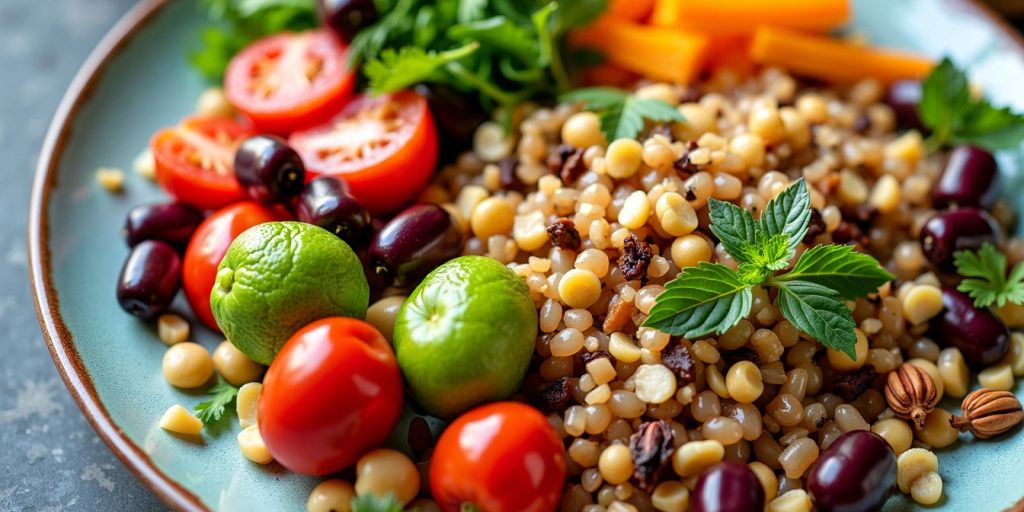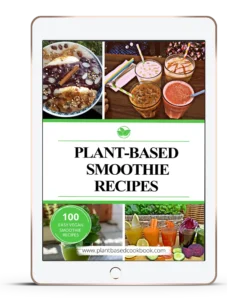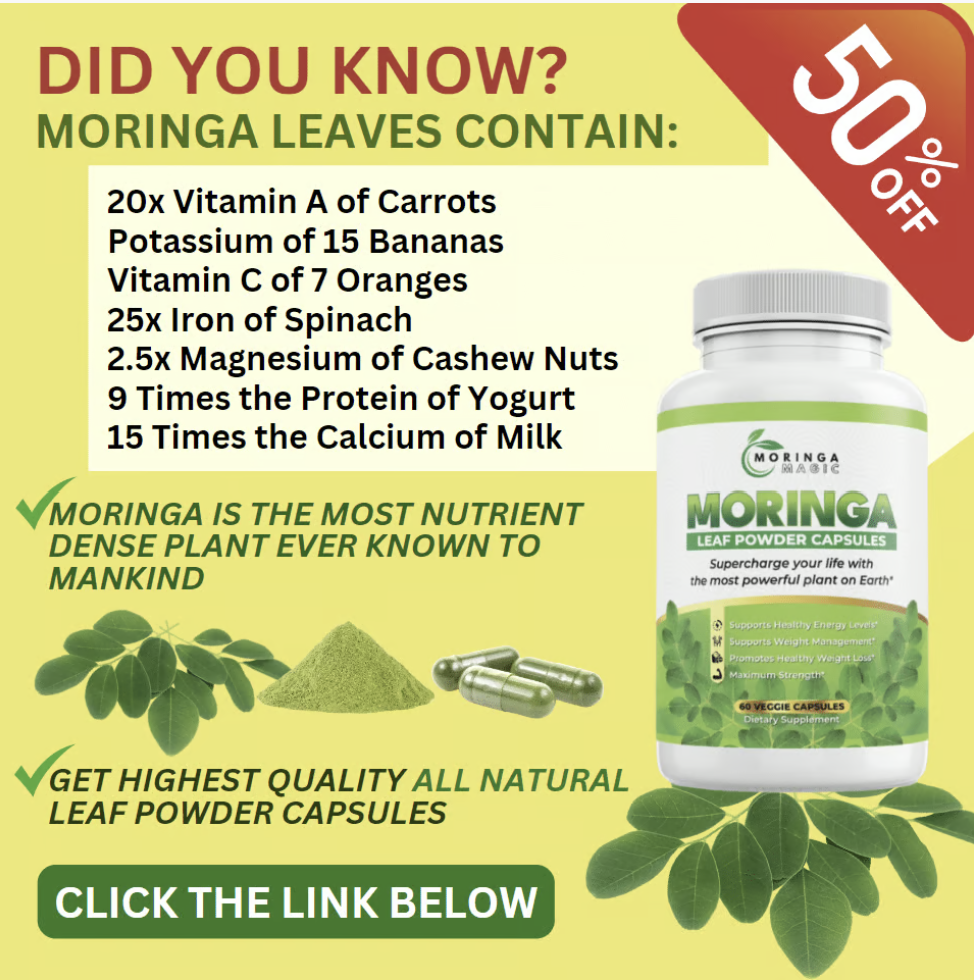Plant-based remedies are not prescriptions that your average doctor will talk about. The few doctors I have found that stand by plant-based remedies have told me how surprised they are that nutrition is not taught in medical school. Yet a whole foods plant-based (WFPB) diet is a powerful tool for improving heart health. By focusing on starches, fruits, vegetables, whole grains, and legumes, many patients have lowered their risk of heart disease and enhanced their overall well-being. Let's explore the fundamentals on how adopting plant-based remedies can transform your heart health, supported by scientific studies and personal success stories.
Plant-based Remedy Fundamentals
- Switching to a whole foods plant-based diet has been shown to lower bad cholesterol levels significantly.
- Plant-based foods are linked to reduced blood pressure and better heart health.
- Eating more fruits and vegetables can help prevent and even reverse heart disease.
- A vegan diet boosts gut health, creating an optimal microbiome with essential fiber and nutrients.
- Most people report feeling more energetic and healthier after going WFPB vegan.
Science Supports Plant-Based Remedies for Heart Health
How Plant-Based Remedies Benefit the Heart
Eating a plant-based diet has become a game changer for the heart. Vegetables, grains, legumes and fruits are generally lower in saturated fats and cholesterol, which is great for cardiovascular health. Plant-based diets benefit heart health because they contain no dietary cholesterol, very little saturated fat, and abundant fiber. Here are some key benefits, according to the Physicians Committee for Responsible Medicine:
- Lower LDL cholesterol: Studies show that a vegan diet* can reduce LDL (bad) cholesterol by up to 30%.
- Reduced blood pressure: Plant-based foods are rich in potassium, which helps lower blood pressure.
- Decreased inflammation: Many plant foods are packed with antioxidants that fight inflammation, a major risk factor for heart disease.
*We're not talking processed boxed food at the grocery store labeled vegan or plant-based. Reading label ingredients is crucial.
Scientific Studies Supporting Vegan Diets
Research backs up the benefits of plant-based remedies for heart health. For instance, a study found that people who follow a WFPB vegan diet have a 75 percent lower chance of developing high blood pressure compared to those who eat meat and cheese. Here’s a quick look at some notable studies:
| Study Name | Key Finding |
|---|---|
| Journal of the American Heart Association (2021) | Plant-based diets significantly lower LDL cholesterol and blood pressure. |
| MDPI (2023) | Vegan diets can reduce markers of inflammation. |
| Stanford Medicine (2023) | Vegan diets improve cardiovascular health in as little as eight weeks. |
Plant Doctors’ Recommendations
I've listened to multiple interviews of medical professionals that have discovered plant-based diets make all the difference in their patients' health. These plant doctors now recommend plant-based remedies for patients with heart issues. They emphasize that eating more vegan whole foods are proven to lead to lower cholesterol and blood pressure levels in most cases. Because high cholesterol and blood pressure are major risk factors for heart disease, this dietary switch is a no brainer.
Adopting a vegan diet can lead to significant improvements in heart health, making it a worthwhile choice for many.
Reducing Cholesterol Levels with Plant-Based Remedies
How Vegan Foods Lower LDL Cholesterol
Switching to a vegan diet has become a game-changer for cholesterol levels. Doctors have discovered over the years that prescription drugs do little to enhance heart health because they do not address the source of the problems. By cutting out animal products, heart patients significantly reduce saturated fats, which are known to raise LDL (bad) cholesterol. This means your heart gets a break. Eating more plant-based foods can help keep your heart and overall cardiovascular system healthy and happy.
Impact on Blood Pressure
Not only does a WFPB vegan diet help lower cholesterol, but it can also positively affect blood pressure. Studies show that people who eat plant-based diets often experience lower blood pressure levels. High blood pressure is a major risk factor for heart disease. But that does not mean it is not preventable. If your doctor tells you it's a result of aging and family history, try getting another opinion from a vegan doctor.
Success Stories from Real People
Many individuals have shared their journeys of switching to a vegan diet and how it has transformed their health. Here are a few highlights:
- John, a 45-year-old, dropped his LDL cholesterol by 30% within three months of going vegan.
- Sarah, a 38-year-old, reported feeling more energetic and noticed her blood pressure dropped significantly after just a few weeks.
| Name | LDL Cholesterol Change | Blood Pressure Change |
|---|---|---|
| John | -30% | -10 mmHg |
| Sarah | -25% | -15 mmHg |
Groundbreaking research shows that replacing meat with plant-based options can lead to significant improvements in heart health. For instance, research from the University of Exeter found that replacing meat with mycoprotein, such as Quorn, can reduce LDL cholesterol by 10 percent over four weeks.
Preventing and Reversing Heart Disease
Plant-based Remedy Research on Heart Disease Reversal
Eating a plant-based diet can be a real game-changer for your heart and general health. Studies show that focusing on fruits, vegetables, and whole grains can help prevent, delay, and even reverse heart disease. Groundbreaking research shows that a plant-based diet doesn’t just prevent heart disease but that it can manage and sometimes even reverse it. By making these dietary changes, you can take proactive steps towards a healthier heart and a longer life.
Vegan Doctors’ Recommendations
Vegan doctors now recommend a plant-based diet for patients with heart issues. They emphasize that eating more plant-based foods can lead to lower cholesterol and blood pressure levels. Since high cholesterol and blood pressure are major risk factors for heart disease, they are used as risk indicators. Doctors prescribing plant-based nutrition instead of expensive medications report these risk indicators drop from the danger zone for patients who adhere to the prescribed diet. Here are some key benefits:
- Lower cholesterol levels
- Reduced risk of heart attacks
- Improved blood circulation
- Enhanced energy levels
Long-Term Benefits of a Vegan Diet
Switching to a vegan diet can be a powerful tool in managing heart disease and fostering a profound sense of overall well-being. It's not just about subtracting animal products; it's about adding a vibrant array of plant-based foods that nourish the body from the inside out. This dietary shift offers a cascade of long-term benefits that extend far beyond just a healthier heart.
One of the most significant advantages is the dramatic impact on cholesterol levels. Vegan diets, rich in fiber and devoid of cholesterol found in animal products, effectively lower LDL (“bad”) cholesterol. This reduction is crucial in preventing plaque buildup in arteries, a major contributor to heart disease. This isn't just a marginal improvement; studies have shown significant decreases in LDL cholesterol in individuals following a vegan diet.
Furthermore, embracing a plant-based lifestyle significantly reduces the risk of heart attacks. By eliminating saturated and trans fats prevalent in animal products, a vegan diet helps maintain healthy blood pressure and reduces inflammation, both critical factors in preventing heart attacks. This proactive approach to heart health offers a tangible reduction in the chances of experiencing such life-threatening events.
Beyond the direct impact on the heart, a vegan diet can lead to improved blood circulation. The abundance of antioxidants and nitrates found in plant-based foods, particularly leafy greens and beets, helps dilate blood vessels, improving blood flow throughout the body. This enhanced circulation boosts oxygen delivery to tissues and organs, leading to increased energy levels and improved overall physical function.
A better life with more energy and vitality
Speaking of energy, many individuals report a surge in vitality after transitioning to a vegan diet. This isn't simply a placebo effect; it's a direct result of consuming nutrient-dense foods that provide sustained energy without the crashes often associated with diets high in processed foods and animal products. This sustained energy translates to improved mood, better sleep, and an enhanced ability to engage in daily activities.
Adopting a vegan diet can only be called ‘just a trend' if you are still eating a ton of processed foods with refined sugars and saturated fats. A true WFPB vegan diet is a scientifically-backed approach to improving heart health and achieving overall well-being. The long-term benefits, from lower cholesterol and reduced heart attack risk to improved circulation and increased energy, make it a compelling and worthwhile choice for anyone seeking a healthier and more vibrant life. It's not just about plant-based remedies – it's a transformative lifestyle. Learn more from the video below:
Boosting Your Gut and Heart Health with a Vegan Diet
Eating a vegan diet can do wonders for your gut health, not just the heart. A plant-based diet is linked to good gut health because it’s packed with fiber and nutrients that help your digestive system thrive.
The Role of Fiber
Fiber is like a superhero for your gut. It acts as a prebiotic, feeding your digestive tract with good bacteria such as Bifidobacteria and Lactobacilli. These bacteria help keep your microbiome balanced and happy. When you eat more fiber, your body produces short-chain fatty acids (SCFAs), which reduce inflammation and improve digestion.
Plant-based Remedies Feed Microbiome Diversity
Imagine your gut as a bustling inner garden, teeming with tiny but mighty helpers – your gut microbiome. Eating a colorful mix of plant-based foods is like tending to this garden, nurturing a diverse community of beneficial bacteria. And guess what? This vibrant gut ecosystem plays a starring role in keeping your heart happy and healthy.
It's not just about ditching the steak and bacon; it's about embracing the incredible variety of plant-powered goodness. Think vibrant fruits bursting with flavor, crunchy veggies, hearty legumes, wholesome grains, and the satisfying crunch of nuts and seeds. Each of these foods brings its own unique set of prebiotics and fibers, acting like specialized fertilizers for different beneficial bacteria in your gut.
A diverse microbiome, packed with a wide array of these helpful bacteria, is like a well-oiled machine. It supercharges your digestion, breaking down complex carbs and unlocking those essential nutrients your body craves. This efficient digestion is a game-changer for heart health, ensuring your body absorbs all the good stuff, especially the nutrients that keep cholesterol and blood pressure in check.
A strong immune system that strengthens the heart
A thriving gut microbiome is like having a superhero immune system. It acts as a powerful shield, defending against harmful invaders and reducing inflammation throughout your body. This is crucial for your heart because chronic inflammation is a major culprit behind clogged arteries and heart disease – think of it as rust building up in your pipes.
Speaking of inflammation, those beneficial gut bacteria are like tiny firefighters, working tirelessly to keep things cool. They produce special compounds, like short-chain fatty acids (one of the stars is called butyrate), that act like miniature fire extinguishers, dampening inflammation and protecting your heart from damage.
And here's another amazing perk: your gut microbiome can even help manage your cholesterol! Certain gut bacteria can actually reduce the amount of cholesterol your body absorbs from food, leading to lower levels of LDL cholesterol (the “bad” kind). This means less gunk building up in your arteries, reducing your risk of heart disease.
So, by embracing a plant-based lifestyle, you're not just nourishing your body; you're cultivating a thriving inner ecosystem that supports your overall well-being, especially your heart health. A diverse and vibrant gut microbiome is a powerful ally in the fight against heart disease, helping you live a longer, healthier, and more vibrant life.
Practical Tips for Transitioning to a Vegan Diet
Making the switch to a vegan diet can feel overwhelming, but it doesn’t have to be! Here are some practical tips to help you along the way:
Starting Slow and Steady
- Take your time: Begin by adding one plant-based meal a day. Gradually increase it to two or more as you get comfortable.
- Focus on crowding out animal products instead of cutting them out completely right away. This approach makes the transition smoother.
Focus on Diversity
- Explore different fruits, vegetables, grains, and legumes to keep your meals exciting and nutritious.
- Try new recipes to discover what you love! This can make the journey enjoyable.
Seek Guidance
- If you’re unsure about your nutritional needs, consider consulting a nutritionist who specializes in vegan diets. They can help you create a balanced meal plan.
- Stay informed about vegan nutrition to ensure you’re getting all the essential nutrients.
Remember, transitioning to a vegan diet is a personal journey. Focus on the foods you can enjoy rather than what you’re giving up.
Key Nutrients in Plant-based Remedies for Heart Health
As pointed out, a vegan diet can be a fantastic way to boost your heart health. But to make sure you’re getting all the nutrients you need, it’s important to focus on a few key areas that are the basics of healing your heart and overall health.
Essential Vitamins and Minerals
A well-planned vegan diet is rich in essential vitamins and minerals. Here are some important ones:
- Vitamin B12: This vitamin is crucial for energy and brain health. Since it’s mostly found in animal products, consider fortified foods or supplements.
- Iron: Plant sources like lentils, chickpeas, and spinach are great for iron. Pair them with vitamin C-rich foods to enhance absorption.
- Calcium: Leafy greens, tofu, and fortified plant milks can help you meet your calcium needs.
Sources of Plant-Based Protein
Protein is essential for muscle health and overall well-being. Here are some excellent vegan sources:
- Legumes: Beans, lentils, and peas are packed with protein and fiber.
- Nuts and Seeds: Almonds, chia seeds, and hemp seeds are not only protein-rich but also provide healthy fats.
- Whole Grains: Quinoa, brown rice, and oats are great options that offer both protein and fiber.
Importance of Omega-3 Fatty Acids
Omega-3s are vital for heart health. While they are commonly found in fish, you can get them from:
- Flaxseeds: Ground flaxseeds are a great addition to smoothies or oatmeal.
- Chia Seeds: These tiny seeds can be added to puddings or baked goods.
- Walnuts: A handful of walnuts can be a tasty snack that boosts your omega-3 intake.
Remember, a balanced vegan diet can help you enjoy a variety of foods while supporting your heart health. Embrace the diversity of plant-based options available to you.
Dr. Neal Barnard shares his knowledge on foods as plant-based remedies in the interview below:
Personal Stories of Heart Health Improvement
Many people have shared their success stories about switching to a vegan diet. They often report feeling more energetic and healthier overall. Here are a few common benefits they mention:
- Lower cholesterol levels
- Reduced blood pressure
- Weight loss
Switching to a vegan diet is not about what you give up, but what you gain. Instead of avoiding the foods you love, start loving the foods that nourish you.
One inspiring story comes from Paul Greenberg, who decided to go vegan for a year to manage his heart disease. He was at risk for heart disease and wanted to see if he could get his blood pressure and cholesterol under control by eating only plant foods. After just a few months, his LDL cholesterol dropped from 160 to 127 mg/dL, and his blood pressure improved significantly.
Here’s a quick look at some of the changes he experienced:
| Name | LDL Cholesterol Change | Blood Pressure Change |
|---|---|---|
| Paul | -33% | -15 mmHg |
These stories show that adopting a vegan diet can lead to significant improvements in heart health, making it a worthwhile choice for many. Real-life success stories back this up, proving that making the switch can be a heart-healthy decision.
A Heart-Healthy Life Choice
Studies continue to show that embracing a plant-based diet can be a truly transformative experience for your heart. It's not just about minor improvements; we're talking about a potential revitalization of your cardiovascular system. Imagine vibrant fruits bursting with antioxidants, colorful vegetables packed with vitamins, and hearty whole grains providing sustained energy. By incorporating these nutritional powerhouses into your daily meals, you're actively lowering your cholesterol and blood pressure, two key factors in heart health.
Research suggests that a plant-based diet can be a powerful tool in the fight against heart disease, not only preventing its onset but potentially even reversing its progression. This dietary approach offers a chance to reclaim your cardiovascular health.
This shift isn't about deprivation or bland meals; it's about discovering a world of exciting and flavorful plant-based cuisine. Think aromatic spices, vibrant herbs, and a rainbow of fresh ingredients. You might be surprised at the sheer variety and deliciousness of plant-based cooking. This culinary journey can lead to the discovery of new favorite dishes and a deeper appreciation for the power of plants.
Embarking on a plant-based journey is an investment in your long-term well-being, a gift to your heart, and an opportunity to explore a world of culinary delights.





